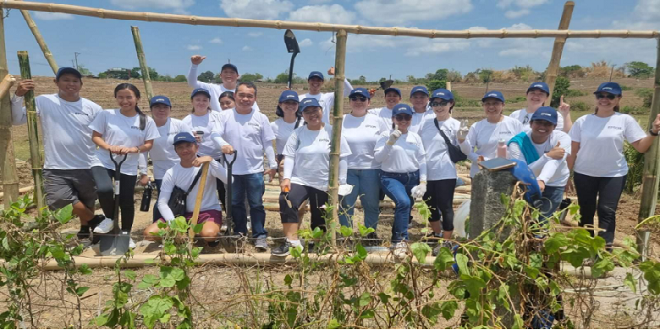
Addressing the pressing issue of food insecurity, Epson, a global technology leader, has joined forces with World Wide Fund for Nature (WWF) Philippines to support the enhancement of food systems and the revitalization of local livelihoods. In response to the challenges faced by millions of people worldwide, particularly in the Philippines where nearly 3.9 million families suffer from hunger and approximately 40% of the population experiences food poverty, Epson and WWF Philippines have collaborated to establish a Food Shed Farming System in Tarlac City.

This innovative system employs a food shed model, utilizing modular greenhouses constructed from locally sourced materials. By incorporating green and natural farming technologies such as composting, rainwater harvesting, and natural pest and disease control, the project aims to promote sustainable production methods while ensuring food security for communities. Moreover, the initiative operates within the boundaries of environmental sustainability, preserving habitats and biodiversity.
Monci Hinay, WWF Philippines project manager, explained, “This agriculture-based livelihood intervention integrates elements of low-impact urban agriculture technologies, providing communities with food security while operating within planetary boundaries and safeguarding habitats and biodiversity.”
Through this partnership, Epson and WWF Philippines are actively contributing to the improvement of food systems and the empowerment of local communities. By embracing sustainable practices and promoting resilience, the collaboration seeks to address the urgent needs of Filipinos and create a more food-secure future.
Ensuring food security and sustainable livelihood for all

The collaborative efforts of Epson, WWF Philippines, local government officials, and the City Agriculturist Office have led to the construction of a food shed in San Jose de Urquico, Tarlac. Epson volunteers actively participated in the project, which aims to provide livelihood opportunities to caretakers responsible for overseeing the production of top-notch vegetables and poultry products. These caretakers will also facilitate the connection between the local community and buyers interested in purchasing the fresh produce and livestock items. Epson volunteers played a vital role during the groundbreaking by engaging in tasks such as plotting and seed preparation, mulching and holing, as well as the actual construction of the food shed.
Another food shed established by Epson is located in Sapang Tagalog, Tarlac. By strategically establishing these two sites, Epson and WWF Philippines are committed to empowering community members through training in food production, value chain management, and business development. The initiative also aims to enhance access to locally produced, high-quality food for households in San Jose de Urquico and Sapang Tagalog. Ultimately, these efforts contribute to strengthening the resilience of low-income communities against the challenges posed by the pandemic and climate change.

Masako Kusama, President and Director of Epson Philippines, expressed enthusiasm about the collaboration with WWF Philippines and the local community in Tarlac, emphasizing Epson’s commitment to enhancing communities and enabling them to achieve sustainability. Kusama recognized the significance of embarking on this journey of sustainability and resiliency, stating that Epson believes the climate-adaptive food shed farming technology will play a pivotal role in building resilience among communities lacking direct access to food sources like farmland or municipal fishing grounds. By implementing this innovative approach, these communities can be protected against hunger and potential disruptions in the food supply. The partnership with WWF Philippines marks an important step forward in Epson’s mission to make a positive impact and support the well-being of communities in need.
Enabling capacity development in food shed farming

The project aims to empower partner communities in Tarlac through technology transfer sessions, equipping them with the necessary knowledge and skills to effectively manage their food sheds. These sessions will focus on sustainable food production practices, developing value chain strategies, and enhancing financial literacy and savings mobilization. By providing continuous learning opportunities, community members will be able to enhance their skills in crop cultivation and livestock production, ensuring successful outcomes.
The establishment of a community-managed food shed serves as a platform to promote the spirit of bayanihan or communal cooperation. It showcases the numerous benefits of compact and protected farming, as well as urban agricultural production. Through this initiative, the community will have a shared purpose of addressing food security and livelihood challenges, fostering a sense of unity and collaboration among its members.






